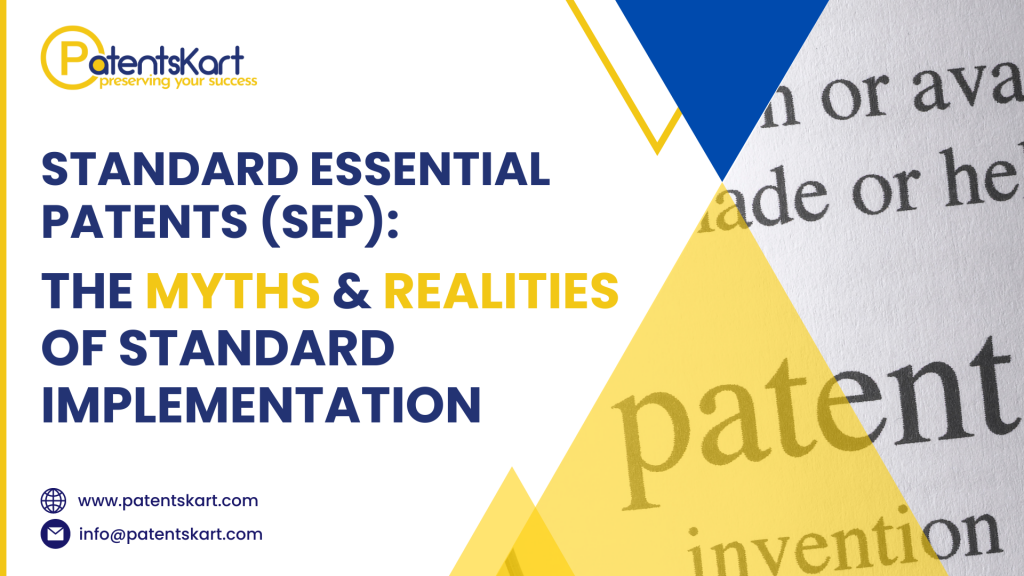Standard Essential Patents (SEPs) are essential for advancing interoperability, fostering innovation, and facilitating the wide-scale adoption of industry standards. The application of standards and the function of SEPs, however, are the subject of misunderstandings. We will examine the myths and facts surrounding standard implementation in this blog and clarify the role that SEPs play in promoting innovation and competition in the technology sector.
The first myth: SEPs stifle innovation
One widespread misperception is that SEPs discourage innovation by requiring implementers to pay licensing and royalty payments. The truth is that SEPs encourage innovation. SEPs encourage businesses to invest in research and development because they make sure that fundamental technologies are widely accessible and that inventors will receive just compensation for their discoveries. Additionally, SEPs provide a cooperative atmosphere where numerous businesses contribute their unique technology to forge a unifying standard, advancing innovation. Check out: Ethical Implications of Balancing SEPs and IP Rights
Myth 2: Implementers must accept unreasonable terms; there is no other option
Another misconception is that SEP holders force implementers to comply with onerous licensing requirements. In fact, through implementing FRAND (Fair, Reasonable, and Non-Discriminatory) principles, standards development organizations (SDOs) and regulatory authorities play a critical role in encouraging fair and reasonable licensing. By offering a framework for agreements between SEP holders and implementers, FRAND makes sure that license conditions are reasonable, fair, and non-discriminatory. In the event of a dispute, measures exist to settle it and establish just conditions for licensing. Check out: What Role Does FRAND Play in Standard Essential Patent Licensing?
Myth 3: All SEPs Are Just As Important
A standard’s accompanying patents may not all be necessary. Patents that are essential to executing the standard and cannot be replaced by other technologies are known as essential. However, figuring out essentiality is a difficult procedure requiring technical analysis and sector knowledge. To guarantee that only those patents required for the standard are identified as SEPs, standard-setting bodies evaluate the essentiality of patents in consultation with patent owners and implementers. Check out: Are All Standard Essential Patents (SEPs) Actually Essential?
Myth 4: SEPs Encourage Monopoly
There is a misperception that because SEP owners have patent rights, they have monopoly power over the market. SEP licensing follows FRAND guidelines, which guard against anti-competitive activity and guarantee an even playing field. SEP owners are required by FRAND to grant implementers fair, reasonable, and non-discriminatory licenses to their core patents. This encourages competition by enabling several businesses to use and adopt the standard, fostering a diversified market and providing consumers with access to a greater selection of goods and services.
Myth 5: Only patent holders benefit from SEPs
It is frequently believed that SEPs primarily help patent owners by generating cash via licensing. The truth is that SEPs are advantageous to the industry as a whole. They make it possible for goods from various manufacturers to work together and interoperate, fostering a flourishing ecosystem and promoting market expansion. SEPs promote competition by establishing technology standards that give businesses a level playing field, spur innovation, and give customers more options for goods and services.
Conclusion:
SEPs, or Standard Essential Patents, foster competition, innovation, and interoperability. They promote innovation by encouraging R&D, fair licensing through FRAND principles, and discouraging anti-competitive behavior. SEPs promote technology, benefit stakeholders, and enhance consumer welfare despite common misconceptions.
Adopting SEPs and reasonable licensing rules can encourage innovation, competition, and better products and services for consumers. Collaboration between stakeholders is essential for the fair and impartial implementation of the SEP. SEPs are motors for progress rather than barriers. Industry standards are essential for advancing technology because they offer users compatibility, options, and benefits. To maximize these advantages, cooperation, and recognition of SEP implementation realities are essential.
Read More: How to Avoid Standard Essential Patents (SEPs) Litigation?







